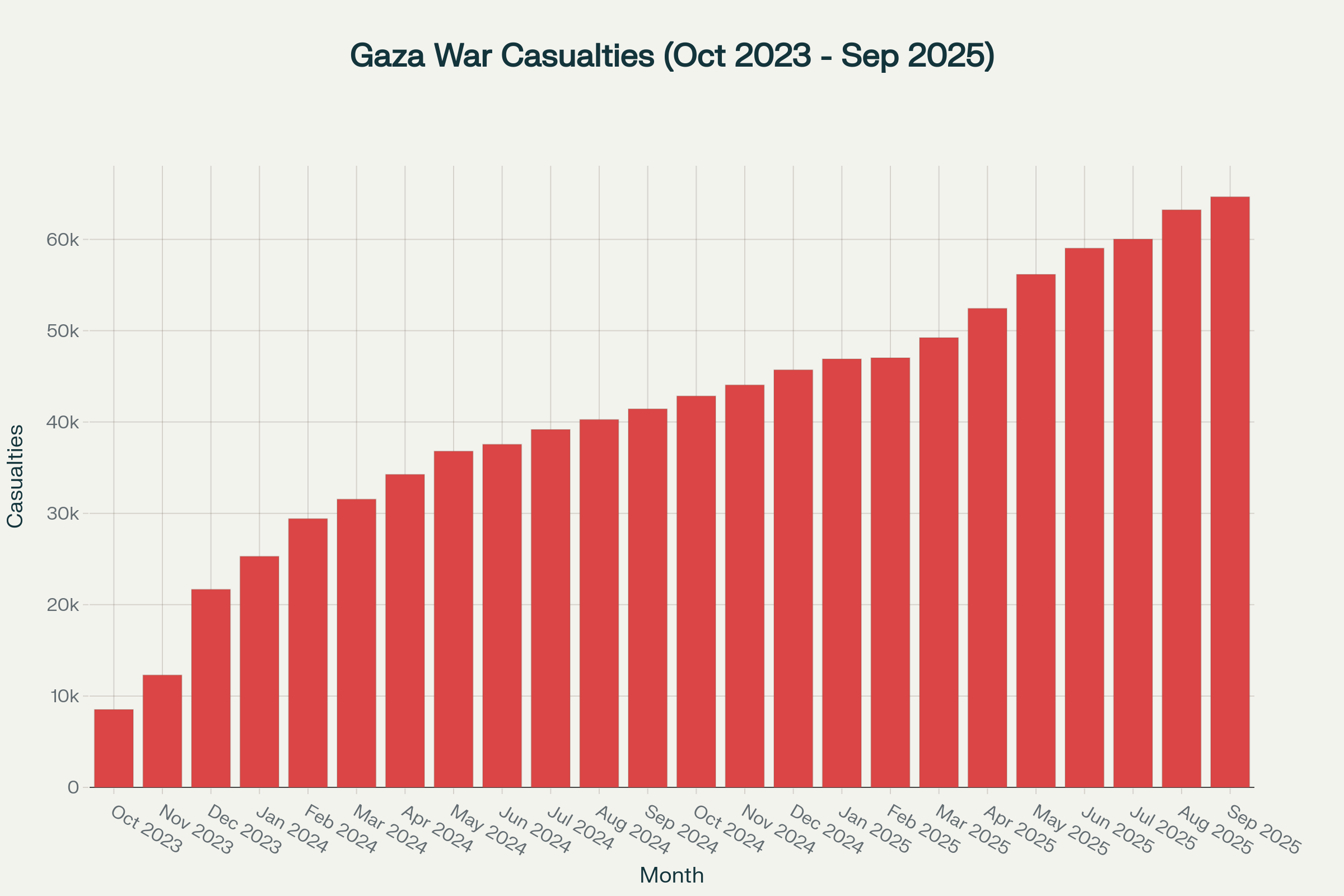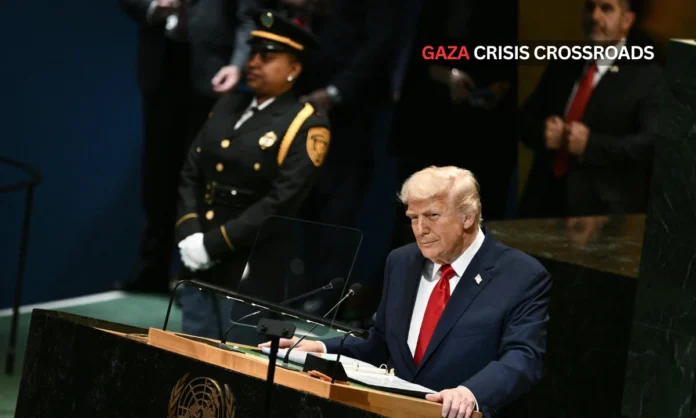Key Highlights:
- Trump Gaza meeting convenes eight Muslim-majority nations including Saudi Arabia, UAE, Qatar, Egypt, Jordan, Turkey, Indonesia, and Pakistan to address escalating crisis
- US proposal in Trump Gaza meeting outlines post-war governance requiring Arab military deployment and reconstruction funding commitments from regional partners
- Trump Gaza meeting precedes UN General Assembly address amid 64,656+ Palestinian casualties and growing international isolation over Gaza policy
The diplomatic stakes reach unprecedented levels as President Donald Trump chairs a pivotal Trump Gaza meeting with leaders from Muslim-majority nations on Tuesday, seeking comprehensive regional buy-in for a post-war framework ahead of his UN General Assembly address. The high-stakes Trump Gaza meeting involves representatives from eight nations: Saudi Arabia, the UAE, Qatar, Egypt, Jordan, Turkey, Indonesia, and Pakistan, representing Trump’s most significant diplomatic initiative to resolve the Gaza conflict since returning to office.
The timing of this Trump Gaza meeting reflects mounting international pressure as the war approaches its two-year anniversary, with Gaza Health Ministry reporting 64,656 Palestinian fatalities and 163,503 injuries as of September 10, 2025. The Trump Gaza meeting occurs as UN humanitarian updates confirm the conflict has internally displaced Gaza’s entire population multiple times, with famine conditions affecting nearly one million residents in Gaza City.

Gaza War Monthly Casualties showing the escalating death toll from October 2023 to September 2025
Strategic Framework Emerging from Trump Gaza Meeting
The Trump Gaza meeting centers on three fundamental pillars requiring substantial regional commitment from Muslim-majority partners. Trump’s proposal presented in the Gaza meeting envisions Arab and Muslim nations deploying military personnel to Gaza, facilitating Israel’s withdrawal while providing security during the transition period. The Trump Gaza meeting simultaneously seeks financial commitments from regional partners to fund reconstruction programs estimated to cost tens of billions of dollars.
A senior US official emphasized that the Trump Gaza meeting “could be fairly significant” as the administration presents “what we think is the only viable path forward” for ending the Gaza conflict. The framework discussed in the Gaza meeting explicitly excludes Hamas from any future governance structure while requiring Arab nations to assume responsibility for Gaza’s post-war administration.
The diplomatic initiative through this Trump Gaza meeting comes as Trump faces growing international isolation over his Gaza policy, with the US recently vetoing UN Security Council resolutions calling for immediate ceasefires. Multiple European countries announced recognition of a Palestinian state during Monday’s UN summit, marking a significant diplomatic shift that faces strong opposition from both Israel and the United States.

Distribution of nations participating in Trump’s Gaza meeting with Muslim-majority leaders
Regional Partners’ Expectations in Trump Gaza Meeting
Arab leaders attending the Trump Gaza meeting are expected to press for concrete Israeli commitments beyond military withdrawal. Regional partners participating in the Gaza meeting are demanding Trump pressure Israeli Prime Minister Benjamin Netanyahu to end the war and refrain from annexing parts of the West Bank, according to sources familiar with the discussions.
The UAE has already warned the White House before the Trump Gaza meeting that Israeli annexation of West Bank territories could collapse the Abraham Accords, Trump’s signature foreign policy achievement from his first presidential term. This diplomatic constraint adds complexity to the Gaza meeting negotiations, as regional partners tie their cooperation to broader Israeli policy changes.
According to diplomatic sources, the Trump Gaza meeting follows Trump’s controversial February proposal for permanent Palestinian displacement from Gaza, which rights experts and the UN labeled as “ethnic cleansing”. While Trump later modified his stance, the proposal’s legacy continues to influence regional partners’ skepticism about US post-war governance plans discussed in the Gaza meeting.
Qatar’s participation in the Trump Gaza meeting remains crucial, as the Gulf state has facilitated previous ceasefire negotiations and maintains communication channels with Hamas leadership. Egypt and Jordan’s involvement in the Gaza meeting reflects their strategic interests in Gaza’s stability, given their shared borders and refugee concerns, while Saudi Arabia’s participation signals the kingdom’s broader normalization considerations with Israel.
International Context Surrounding Trump Gaza Meeting
The Trump Gaza meeting occurs against unprecedented international scrutiny, with a UN Commission of Inquiry concluding that Israel has committed genocide in Gaza. The commission’s September 16 report found that Israeli authorities committed four of five genocidal acts defined by the 1948 Genocide Convention, adding pressure to the Gaza meeting discussions.
The UN commission’s findings, based on comprehensive examination through July 2025, determined that “genocidal intent was the only reasonable inference” from Israel’s military operations pattern in Gaza. These conclusions add international legal pressure to the Trump Gaza meeting, as regional partners navigate between US alliance commitments and mounting domestic pressure over Gaza casualties.
According to the latest UN humanitarian data relevant to the Gaza meeting, 499 Palestinians were killed between September 3-10, 2025, while Israeli military operations continued across Gaza Strip. The UN Office for the Coordination of Humanitarian Affairs reports that 540 aid workers have been killed since October 2023, including 373 UN staff members, creating additional urgency for the Gaza meeting outcomes.
The Gaza meeting timing coincides with Trump’s UN General Assembly address on Tuesday, marking his first speech to the world body since returning to office, occurring as world leaders increasingly embrace Palestinian statehood recognition. The address follows the Gaza meeting amid Trump’s broader critique of “globalist institutions” that have “significantly decayed the world order,” according to White House Press Secretary Karoline Leavitt.
Gaza Humanitarian Crisis and Post-War Solutions
The scale of Gaza’s humanitarian catastrophe presents enormous challenges for any post-war reconstruction framework discussed in the Gaza meeting. According to UN data relevant to the Trump Gaza meeting discussions, famine conditions affect Gaza City’s nearly one million residents, with 404 malnutrition-related deaths documented since October 2023, including 141 children.
Infrastructure destruction requiring discussion in the Gaza meeting includes clearing over 50 million tonnes of debris and unexploded ordnance, a process that could take up to 21 years. The reconstruction cost, estimated in tens of billions of dollars, necessitates substantial international donor commitments that the Gaza meeting framework seeks to secure from regional partners.
Current humanitarian aid flows remain drastically insufficient, with only 32 percent of daily minimum food requirements reaching Gaza through UN coordination as of September 2025. The World Food Programme’s Executive Director emphasized that “more aid needs to get into Gaza at scale and continually” to address the catastrophic hunger trajectory, adding urgency to Gaza meeting deliberations.
Healthcare system collapse compounds reconstruction challenges discussed in the Gaza meeting, with WHO reporting that about half of Gaza’s functional hospitals are in Gaza City, including 36 percent of all hospital beds and 50 percent of intensive care unit capacity. The UN health agency warns that the “crippled health system cannot afford to lose any of these remaining facilities” amid ongoing military operations, emphasizing the critical nature of the Gaza meeting outcomes.
Final Assessment
The Trump Gaza meeting represents a watershed moment in Middle East diplomacy, serving as a critical test of regional partners’ willingness to assume post-war responsibilities in Gaza. The success of this Gaza meeting will largely determine whether Trump can deliver on his campaign promise to quickly end the Gaza conflict, now approaching its two-year mark with devastating humanitarian consequences. As international pressure mounts through genocide accusations and growing Palestinian statehood recognition, the president’s ability to secure Arab commitments through the Trump Gaza meeting becomes essential for any sustainable Gaza resolution. The stakes of this Gaza meeting extend beyond Gaza’s future, potentially reshaping US relationships with key Middle Eastern allies and determining the viability of Trump’s broader regional diplomatic architecture.


